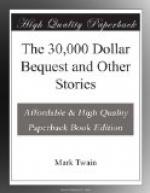The expression is very interesting. J.W. Titian.
(Keeps a macaroni store in Venice, at the old family stand.)
It is the neatest thing in still life I have seen for years.
Rosa Bonheur.
The smile may be almost called unique. Bismarck.
I never saw such character portrayed in a picture
face before.
De Mellville.
There is a benignant simplicity about the execution of this work which warms the heart toward it as much, full as much, as it fascinates the eye. Landseer.
One cannot see it without longing to contemplate the artist.
Frederick William.
Send me the entire edition—together with the plate and the original portrait—and name your own price. And—would you like to come over and stay awhile with Napoleon at Wilhelmsh:ohe? It shall not cost you a cent. William III.
DOES THE RACE OF MAN LOVE A LORD?
Often a quite assified remark becomes sanctified by use and petrified by custom; it is then a permanency, its term of activity a geologic period.
The day after the arrival of Prince Henry I met an English friend, and he rubbed his hands and broke out with a remark that was charged to the brim with joy—joy that was evidently a pleasant salve to an old sore place:
“Many a time I’ve had to listen without retort to an old saying that is irritatingly true, and until now seemed to offer no chance for a return jibe: ‘An Englishman does dearly love a lord’; but after this I shall talk back, and say, ‘How about the Americans?’”
It is a curious thing, the currency that an idiotic saying can get. The man that first says it thinks he has made a discovery. The man he says it to, thinks the same. It departs on its travels, is received everywhere with admiring acceptance, and not only as a piece of rare and acute observation, but as being exhaustively true and profoundly wise; and so it presently takes its place in the world’s list of recognized and established wisdoms, and after that no one thinks of examining it to see whether it is really entitled to its high honors or not. I call to mind instances of this in two well-established proverbs, whose dullness is not surpassed by the one about the Englishman and his love for a lord: one of them records the American’s Adoration of the Almighty Dollar, the other the American millionaire-girl’s ambition to trade cash for a title, with a husband thrown in.
It isn’t merely the American that adores the Almighty Dollar, it is the human race. The human race has always adored the hatful of shells, or the bale of calico, or the half-bushel of brass rings, or the handful of steel fish-hooks, or the houseful of black wives, or the zareba full of cattle, or the two-score camels and asses, or the factory, or the farm, or the block of buildings, or the railroad bonds, or the bank stock, or the hoarded cash, or —anything that stands for wealth and consideration and independence, and can secure to the possessor that most precious of all things, another man’s envy. It was a dull person that invented the idea that the American’s devotion to the dollar is more strenuous than another’s.




